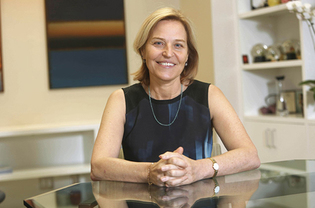
Ann Johansson
Kelsey C. Martin
Medical Researcher
By Randi Hutter Epstein ’90MD
Kelsey Martin ’91PhD, ’92MD, was eight months pregnant, halfway through medical school and finishing her doctoral thesis in cell biology, when a female faculty member looked at her belly and said, “Well, there goes your career.”
Thirty years later, Martin is dean of the David Geffen School of Medicine at UCLA and a member of both the American Academy of Arts and Sciences and the National Academy of Medicine. Reflecting on that long-ago jab, she says, “I think it benefited me to be self-motivated.”
Martin’s med school classmates remember her dashing to New York City on most Wednesdays and Saturdays for dance classes—Haitian, Brazilian, and Afro-Cuban. Since moving west, she has added salsa to her repertoire. “From the outside, it feels like it doesn’t quite fit together,” she says, “but from the inside, there’s a logic.”
Her postdoctoral research in neuroscience, with Nobel laureate Eric Kandel at Columbia, upended conventional thinking about how memory is stored. Most scientists had focused on neurons, the brain cells. Martin discovered that memories also affect the strength and number of connections between neurons. Those findings led to more questions she is still pursuing in her lab. “I’m interested in who we are as human beings, and what it means to be a human being and how we organize ourselves in societies,” she says. “But I am, at heart, a cell biologist.”
That was not how she’d imagined her career trajectory when she decided to go into medicine. She’d been thinking big-picture: infectious disease. Health policy. Global travel. But when she returned from the Peace Corps to complete her requirements for medical school, she landed a job in the laboratory of infectious-disease researcher I. George Miller. The experience ignited her passion for basic science research.
“I got turned on to the creativity,” she says. “I liked the communal aspects, the deep problem solving. I like doing experiments and things with my hands and looking at things under the microscope. There’s a pleasure from this level of scholarship.”
When she arrived at UCLA in 1999 and learned that only 20 percent of the MD/PhD students were women—compared with 50 percent at Yale—she joined the admissions committee. Her work there not only led to an increase in women in the program, but also showed her how much she enjoyed being part of university administration.
These days she is grateful for the opportunity to do basic science—in which her questions go “one inch wide and a mile deep”—while also serving as the dean, a post that allows her to oversee broader perspectives on healthcare and medical education.
And yet, that slur decades ago still resonates. (Perhaps it reshaped a few brain cell connections.) Martin, who is married and has two children and two stepchildren, tells younger women in science: “There’s a sense you have to do absolutely everything all at once”—but that isn’t the case. “Your life has a whole trajectory.”
 loading
loading